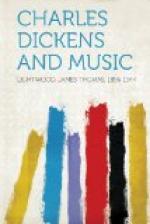We have a different picture of him on another occasion, as he sits ’chanting choir music in a low and beautiful voice, for two or three hours’—a somewhat unusual exercise even for the most enthusiastic choirmaster. But this was before the strange journey with Durdles, and we can only guess at the weird thoughts which were passing through the musician’s mind as he sat in his lonely room.
We have only a brief reference to the choir of Cloisterham Cathedral. Towards the end we read of them ’struggling into their nightgowns’ before the service, while they subsequently are ’as much in a hurry to get their bedgowns off as they were but now to get them on’—and these were almost the last words that came from the Master’s pen.
Anthems
There is an interesting reference to anthems in connexion with the Foundling Hospital,[15] an institution which Dickens mentions several times. Mr. Wilding (N.T.), after he had been pumped on by his lawyer in order to clear his head, names the composers of the anthems he had been accustomed to sing at the Foundling.
Handel, Mozart, Haydn, Kent,
Purcell, Doctor Arne,
Greene, Mendelssohn.
I know the choruses to those
anthems by heart. Foundling
Chapel collection.
Mr. Wilding had a scheme of forming his household retainers and dependents into a singing-class in the warehouse, and a choir in the neighbouring church. Only one member, Joey Ladle, refused to join, for fear he should ’muddle the ‘armony,’ and his remark that
Handel must have been down
in some of them foreign
cellars pretty much for to
go and say the same thing
so many times over
is certainly not lacking in originality.
Hymns and Hymn-Tunes
There are many purists in church music who object to adaptations of any kind, and we do not know what their feelings are on reading the account of the meeting of the Brick Lane Branch of the United Grand Junction Ebenezer Temperance Association. In order to vary the proceedings Mr. Anthony Humm announced that
Brother Mordlin had adapted the beautiful words of ‘Who hasn’t heard of a Jolly Young Waterman’ to the tune of the Old Hundredth, which he would request them to join in singing. (Great applause.) And so the song commenced, the chairman giving out two lines at a time, in proper orthodox fashion.
It was this air that Mr. Jerry’s dog, as already related, ground out of the barrel-organ, but, besides this particular melody, we do not find that Dickens mentions any other hymn-tune. The hymns referred to are rather more in number. In The Wreck of the Golden Mary Mrs. Atherfield sang Little Lucy to sleep with the Evening Hymn. There is a veiled reference to Ken’s Morning Hymn in O.C.S., where Sampson Brass says:




